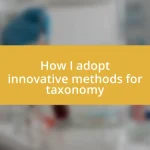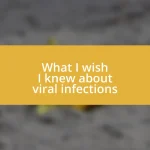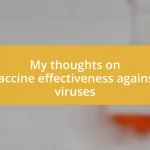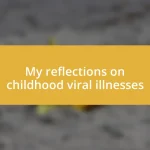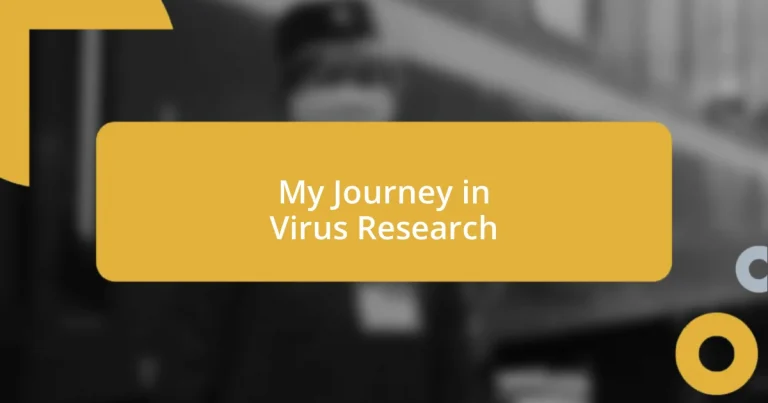Key takeaways:
- Initial exposure to virus research in high school ignited a strong passion for understanding and combating viral threats.
- Presenting research at an international conference significantly boosted confidence and reinforced the importance of engaging with the scientific community.
- Collaborative projects led to unexpected breakthroughs, highlighting the value of networking and interdisciplinary approaches in advancing virus research.
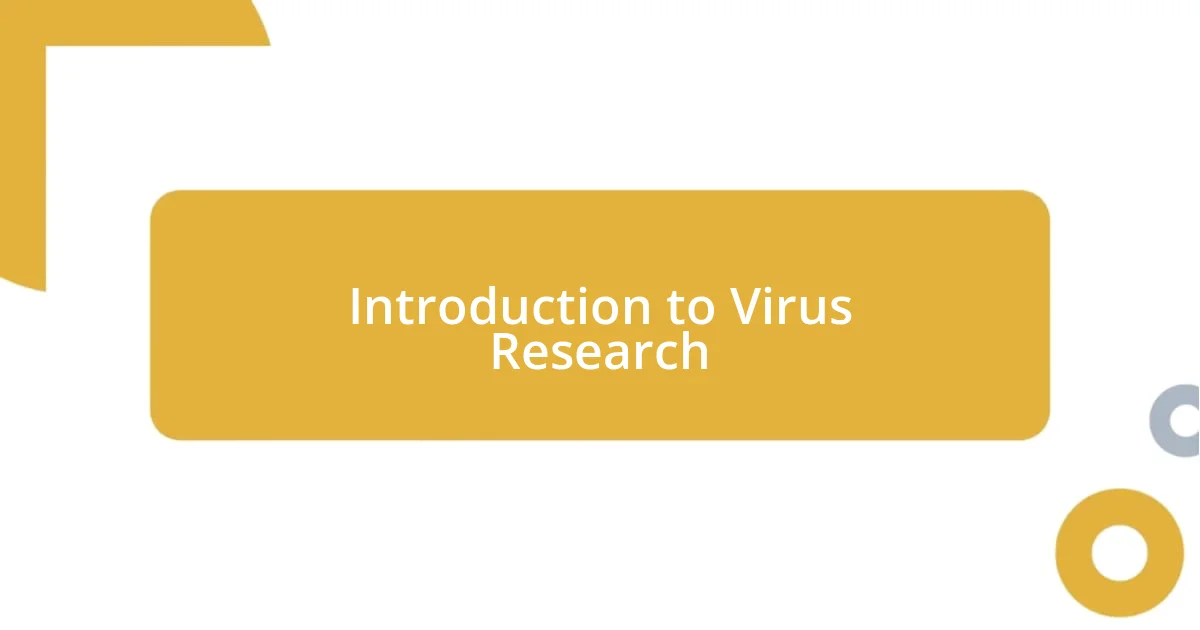
Introduction to Virus Research
Virus research is a fascinating and vital field that delves into the intricacies of these microscopic entities that can have profound impacts on our health and society. I remember the first time I encountered the concept of viruses in a college lab; it felt like stepping into a captivating, yet slightly intimidating world where understanding the unseen could unlock significant discoveries. How many of us consider the role that a tiny virus can play in shaping global health trends?
In my journey through virus research, I’ve witnessed the ebbs and flows of scientific advancements. Each finding feels like a puzzle piece fitting into a larger picture, from tracking transmission patterns to developing vaccines that save lives. Isn’t it amazing to think about how much we can actually learn from something so minute? The emotional weight of this knowledge often drives researchers, fueling a sense of responsibility to communicate findings that could ultimately protect communities.
As I reflect on the evolution of virus research over the years, I can’t help but marvel at how it has transformed, particularly in response to emerging viral threats. Early experiences taught me the importance of staying curious and adaptable; every new strain brings unique challenges and opportunities. This realm continually asks us, how can we innovate and safeguard our future in the face of such change? The answers often lie within rigorous research, relentless inquiry, and a shared commitment to public health.
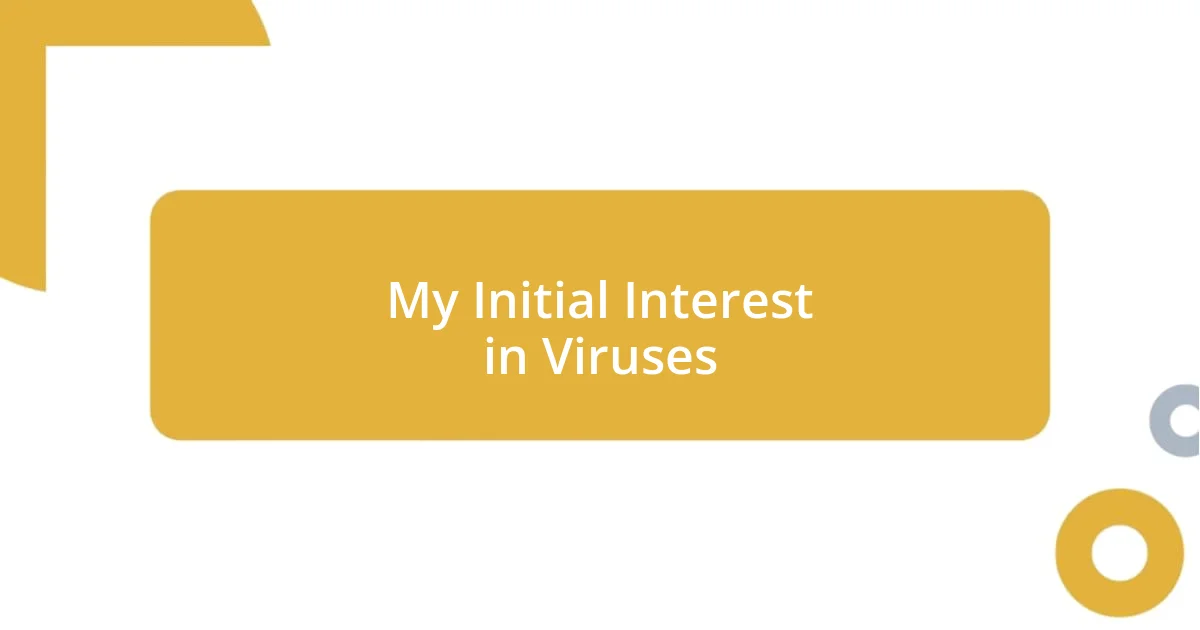
My Initial Interest in Viruses
My journey into the world of viruses truly began in high school when I stumbled across an article about how smallpox was eradicated. I was captivated by the idea that an invisible organism could wield so much power and, ultimately, be used as a tool for public health. That moment ignited a fire within me; I wanted to understand not only how they work but also how we can outsmart them in the ongoing battle for human health.
Fast forward a few years, and I found myself in an introductory microbiology class where we got hands-on experience with viral cultures. I remember the thrill of observing them under a microscope, realizing that these tiny entities could have devastating effects on lives. It felt surreal; one day, I was reading about them, and the next, I was witnessing their implications first-hand. This juxtaposition of theory and reality solidified my commitment to virus research. Isn’t it fascinating how direct exposure can shape our passion and pave the way for our future endeavors?
Reflecting on those early experiences, it’s evident how personal they were for me. Each lesson learned brought with it a mix of wonder and introspection. As I considered the stories of those affected by infectious diseases, I couldn’t help but feel an overwhelming blend of empathy and urgency to contribute to this field. The emotional drive to make a difference became a pivotal aspect of my journey, reminding me that beyond the science lies the human element we are all striving to protect.
| Experience | Reflection |
|---|---|
| Reading about smallpox eradication | Ignited my curiosity about viruses |
| Hands-on experience in microbiology class | Solidified my commitment to virus research |
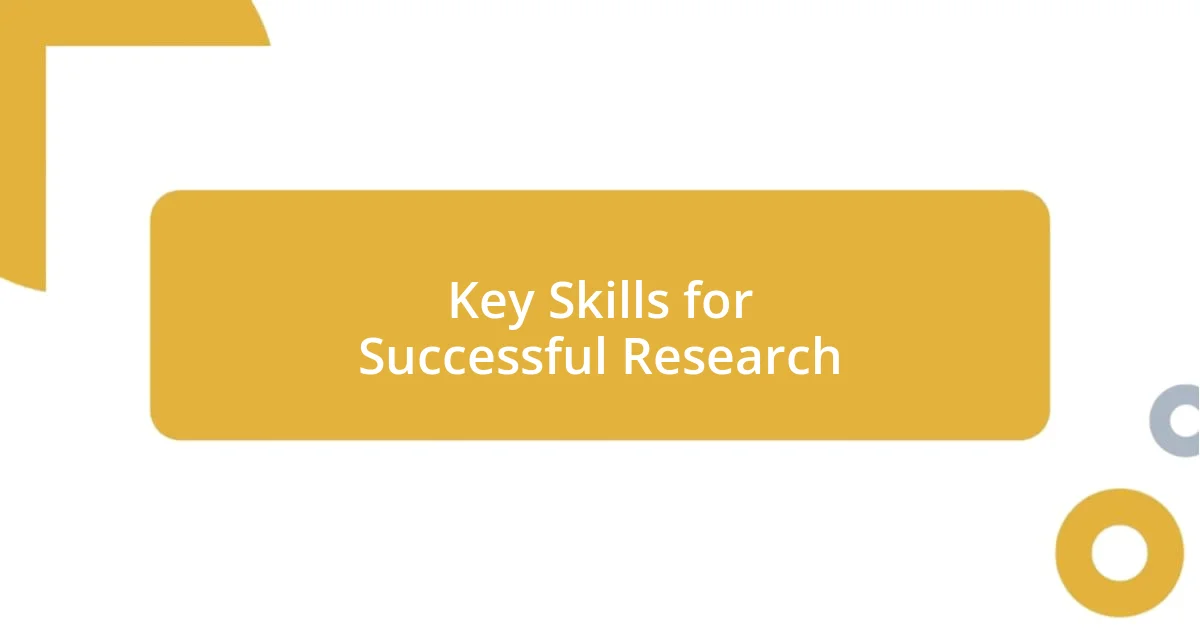
Key Skills for Successful Research
When I think about the key skills that have shaped my success in virus research, several crucial abilities come to mind. Effective communication stands out, enabling me to collaborate with diverse teams and convey complex ideas clearly. I vividly recall a project where I had to present findings to both scientists and non-scientists. Bridging that gap reinforced my belief that sharing knowledge is just as important as generating it.
Here’s a quick list of the essential skills I believe create a strong foundation for successful research:
- Analytical Thinking: The ability to interpret data and identify patterns is vital.
- Adaptability: Research can pivot quickly, especially in the face of new viral strains; being flexible is key.
- Attention to Detail: Every experiment relies on precision, and small oversights can lead to significant discrepancies.
- Collaboration: Working with interdisciplinary teams enriches research; I’ve learned so much from colleagues in different fields.
- Time Management: Balancing multiple projects while meeting deadlines is essential in this fast-paced environment.
I find that emotional resilience is another skill that shapes our journey in this field. The highs of breakthroughs can be exhilarating, but the lows—like a failed experiment—can be disheartening. I remember a particularly challenging period when a grant proposal was rejected. Instead of seeing it as a setback, I chose to view it as an opportunity to refine my ideas and approach. This mindset shift helped me press forward, reminding me that perseverance is as important as technical know-how in research.
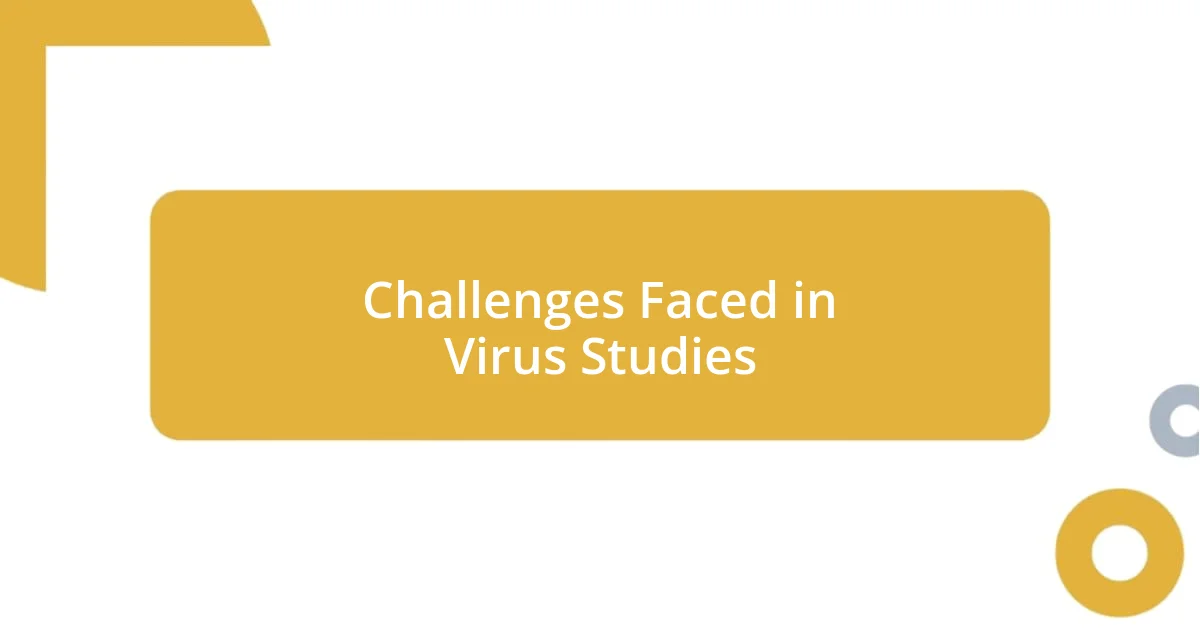
Challenges Faced in Virus Studies
Virus studies come with their fair share of challenges. One of the most significant hurdles I’ve encountered is the constant evolution of viruses. They adapt so quickly that just when you think you’ve got a handle on a particular strain, it evolves into something new. There was a time when I was studying influenza, and I spent countless hours analyzing data only to realize that the strain had already changed, making all my research feel like it was for naught. It’s both humbling and frustrating. Have you ever invested so much effort into something only to watch it shift right underneath you?
Another challenge that often leaves me scratching my head is the complexity of conducting clinical trials. The process is long and filled with red tape. I vividly remember the bureaucratic tangles involved in securing approvals for a vaccine trial. Each regulatory hurdle felt like an eternity, which truly tested my patience. Sometimes, I worried if the delays would dampen the urgency of the research, especially when public health depends on timely findings. It’s a stark reminder that while scientific inquiry is pivotal, it often dances hand-in-hand with administrative processes that can feel cumbersome.
Additionally, resources can be a major limiting factor. As I navigated my studies, I found that funding often dictates what research is feasible. I recall a project proposal I poured my heart into, only to be told there wasn’t enough budget for the necessary equipment. It stung, but it taught me to be resourceful and innovative with what I had. It’s fascinating how necessity can breed creativity, right? Embracing challenges like these has shaped my understanding of the field and fueled my determination to overcome them.
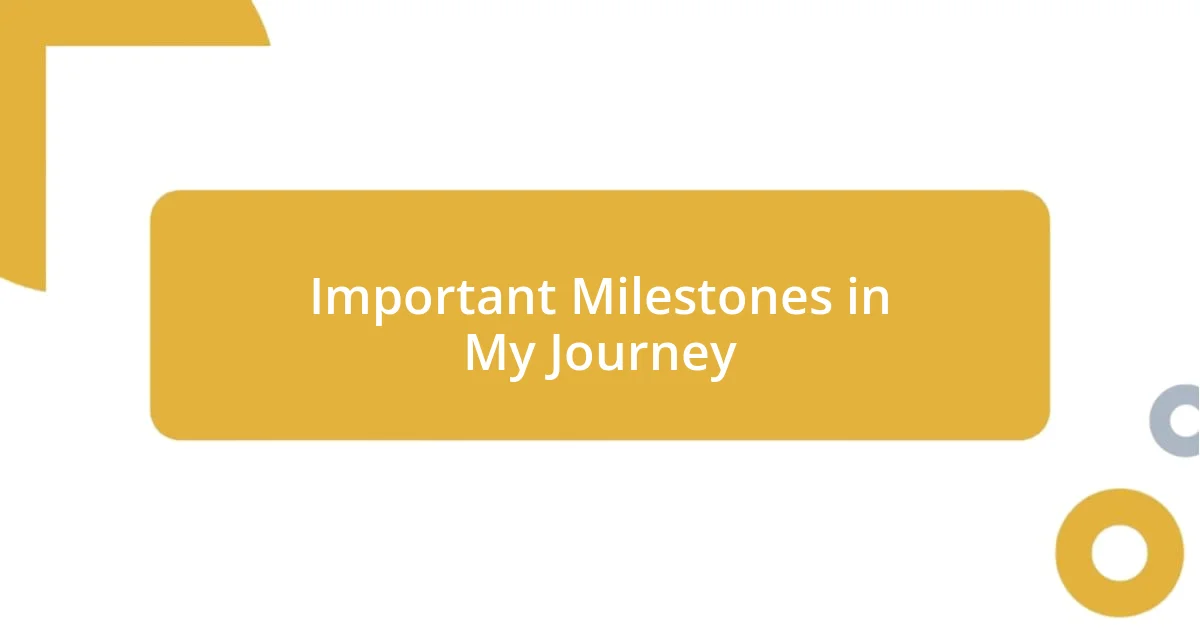
Important Milestones in My Journey
I can point to a few pivotal moments in my journey that really defined my path in virus research. One key milestone was when I joined my first research lab. It was intimidating yet exciting, stepping into a space where groundbreaking work was happening. I remember the day I was given my first project—studying viral replication in cultured cells. That initial assignment felt like jumping into the deep end without a life vest. But it ignited a passion within me that set the trajectory for my entire career.
Another significant milestone was when I presented my research at an international conference. It was electrifying to stand before experts from all over the world, sharing my findings on a novel approach to vaccine development. I’ll never forget the rush that came with answering questions afterward. Those interactions taught me the value of engaging with the scientific community and reaffirmed my commitment to making impactful contributions in the field.
Then there was the moment I led my first major research grant proposal. It was a thrilling yet nerve-wracking experience. Writing the proposal challenged my understanding and pushed me to articulate my vision clearly. When we received the funding, I felt an overwhelming sense of validation—proof that my ideas had merit. Have you ever experienced that moment of clarity when everything you’ve worked toward finally comes together? It was a powerful reminder that milestones aren’t just about the accomplishments but the growth that comes along the way.
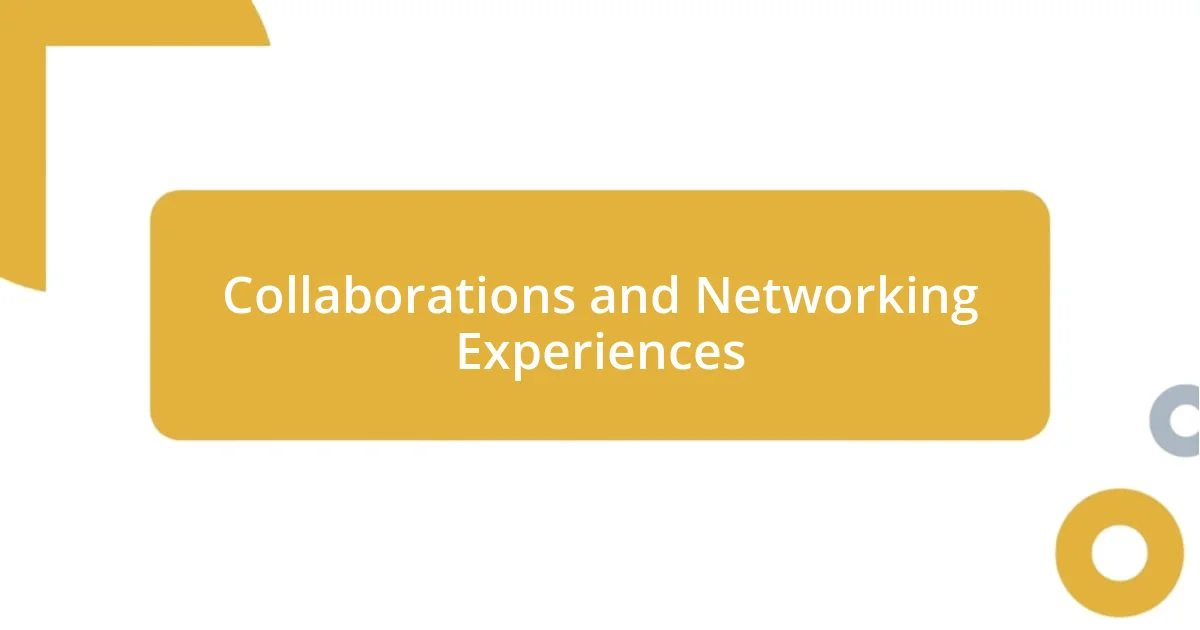
Collaborations and Networking Experiences
Collaboration has often resulted in breakthroughs I didn’t expect. On one occasion, I partnered with a virologist from a neighboring institution, and we combined our research on dengue fever and Zika virus. Not only did we uncover connections that could lead to better treatments, but the camaraderie fostered a creative environment that pushed my boundaries. Have you ever teamed up with someone and discovered new angles you hadn’t considered before?
Networking, too, has played a crucial role in my journey. I distinctly remember my first informal chat at a symposium that evolved into a significant mentorship. The scientist I spoke with shared insights that redefined my approach to experimental design. Those moments of genuine connection often lead to unexpected opportunities—like when she invited me to co-author a paper. Has a simple conversation ever opened doors for you?
I’ve also learned the value of attending workshops and seminars. I once attended a small workshop on emerging viruses, and it felt like being in a think tank of ideas. Engaging with passionate peers and experienced professionals sparked my curiosity and sparked collaborations that lasted beyond the event. It’s incredible how these experiences can illuminate paths you never knew existed!
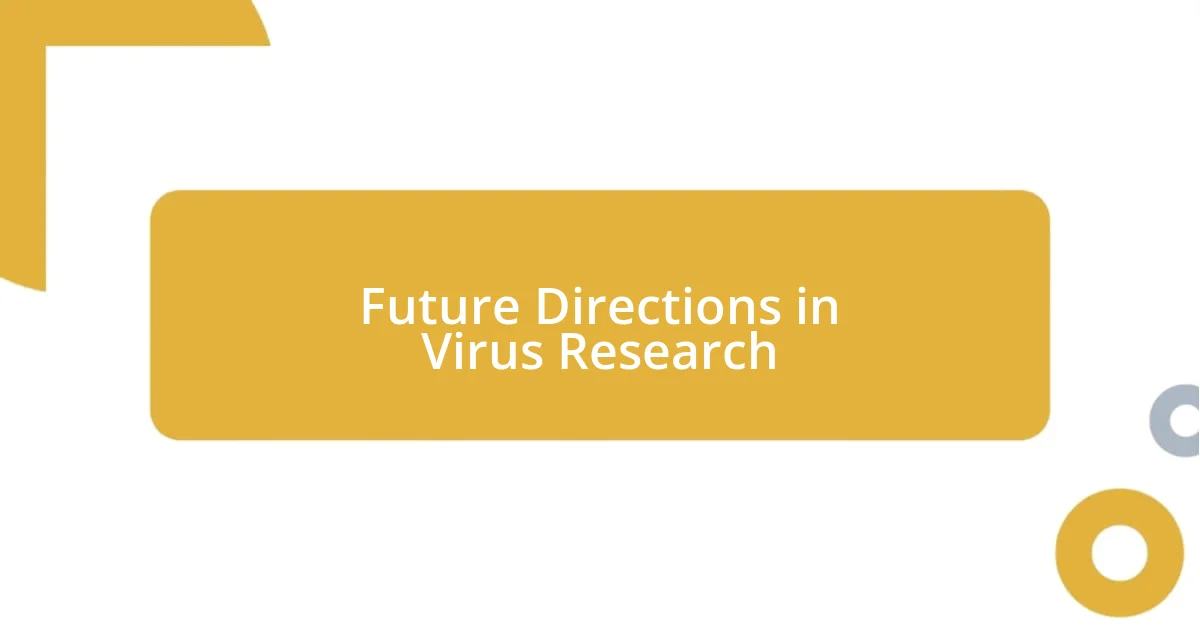
Future Directions in Virus Research
As I gaze into the future of virus research, I find myself particularly excited about the potential of personalized medicine. Imagine a world where vaccines and treatments are tailored to an individual’s genetic makeup! The aspect of individual variability in immune response has always fascinated me, and I believe we’ll see breakthroughs that allow us to customize strategies for combating viral infections. Could this be the revolutionary shift we’ve been waiting for in public health?
I also see a growing focus on interdisciplinary approaches. Recently, I had an enlightening discussion with an environmental scientist about how climate change affects virus transmission dynamics. This insight opened my eyes to the ways ecologists, virologists, and public health officials can collaborate more effectively. The thought of merging knowledge from these fields excites me—after all, tackling complex challenges like pandemics requires diverse perspectives. How do we create pathways for these collaborations and ensure they yield meaningful results?
Lastly, the advancements in technology, particularly in data science and artificial intelligence, promise to transform our research methodologies. I’ve been experimenting with machine learning models to predict viral outbreaks, and the results are astonishing. There’s something truly thrilling about harnessing these technologies to enhance our understanding of viruses. What new insights could we uncover by combining computational power with traditional wet-lab work? The possibilities feel limitless, and I can’t wait to see how they unfold!


